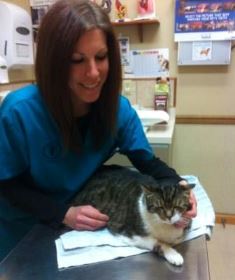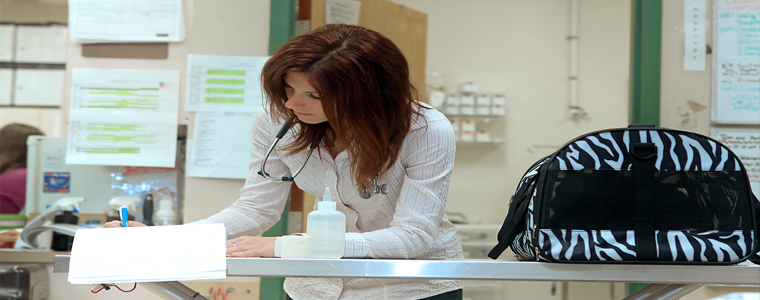There are many factors to be considered in assessing the nutritional needs of a dog or cat to ensure and promote optimal health. Good nutrition that you can trust which targets the pet’s individual needs based on a professional Nutritional Assessment can really enhance a pet’s quality of life.
A Basic Nutritional Assessment screening should be performed when a veterinarian is initially evaluating a pet. When visiting your vet for an annual wellness exam, please let him or her know anything and everything about your pet that you feel may be important for your pet’s overall quality of life. This includes new or old behavioral issues, environmental or social changes and especially diet choices.
The basic nutritional evaluation includes a routine history followed by a 12 system yearly physical examination performed by a veterinarian. Another important part of the visit is you and your veterinarian reviewing out loud your pet’s previous medical records. This may or may not include your pet’s previous diagnostic baselines like blood work, urines, etc.
You should be asked to discuss current diets, activity level, and other important factors. During every patient exam your veterinarian is recording and adding vital assessment information like temperature, pulse, respiration, and pain assessment to your pet’s medical record. Nutrition is the 5th Vital Assessment!
An Extended Nutritional Evaluation is done by your veterinarian when one or more nutrition-related risk factors are found. Some risk factors that affect nutrition assessment are age, activity level, muscle condition, medications, supplements, and disease conditions. Some of the really common genetic acquired disease conditions that veterinarians diagnose daily are: dental disease (number one) followed by kidney disease, liver disease, heart disease, thyroid disease, diabetes, pancreatitis, inflammatory bowel disease, acid reflux, high triglycerides and cholesterol issues, urinary tract infections and bladder stones, to name a few.
Our pets age at a much faster rate than we people do, and they unfortunately inherit many preprogrammed genetic problems silently and suddenly all of the time. You and your veterinarian are your pet’s best advocate. Early diagnosis coupled with a proactive, preventative state of mind is the best medicine for pets who can’t talk.
 There is a common saying in veterinary medicine: If you don’t look you will not find until it’s too late sometimes. Therefore, it is important to remember that pets suffer silently without loving and well-intentioned owners even knowing until veterinary driven evaluations and conversations uncover potential or under-the-radar problems.
There is a common saying in veterinary medicine: If you don’t look you will not find until it’s too late sometimes. Therefore, it is important to remember that pets suffer silently without loving and well-intentioned owners even knowing until veterinary driven evaluations and conversations uncover potential or under-the-radar problems.
Routine annual and baseline testing can include complete blood counts (CBC), biochemistry panels, urinalysis, Heartworm, Lyme, feline Leukemia, and other tests. Hopefully, all results are in normal ranges. However, if abnormal results are identified early, then maximum health and quality of life can be preserved. Great nutrition is the most natural way to healing a patient from the inside out.
Many pets, especially those with increased risk factors, could greatly benefit from a therapeutic diet that targets specific disease or illness. Please ask your veterinarian to make a specific nutritional recommendation for your individual pet. They can guide you better than television commercials or the Internet. Your pet’s individual medical information is a vital part of properly assessing the best nutrition for you pet.
Dr. Joe Martins, DVM, Belle Mead Animal Hospital





